I hear voices. Or perhaps it’s wind singing through this canyon in Jordan. We push and pedal toward a notch in a spiny ridge. Goat prints and rock cairns mark the way. The view makes me giggle. Old trails in old lands have that effect. A playground of rock rolls and sandstone slabs funnel toward a strip of trail as white as gypsum that cuts across a bench of rare flat ground.
“Yalla!” Sari calls out, Arabic for “Let’s go.”
That’s the second most important expression for mountain bikers in Jordan – all dozen or so of them. The first is “Inshallah” (God willing.)
New trails in an ancient land
If you wish for something to happen then go to the top and invoke God – “Inshallah.” Even a non-believer like me believes that prayers are sometimes answered with a gift, and this is one that keeps on giving. We’re in southwestern Jordan, in the remote Abu Qusaib Valley. Where no bikes have gone before, we tell ourselves, making an unverifiable but at the same time safe claim. Even the Bedouin shepherd we met at the trailhead earlier who, with his detailed trail information, somehow seemed to get mountain biking, said he had never seen “those things” around here, pointing at our bikes.
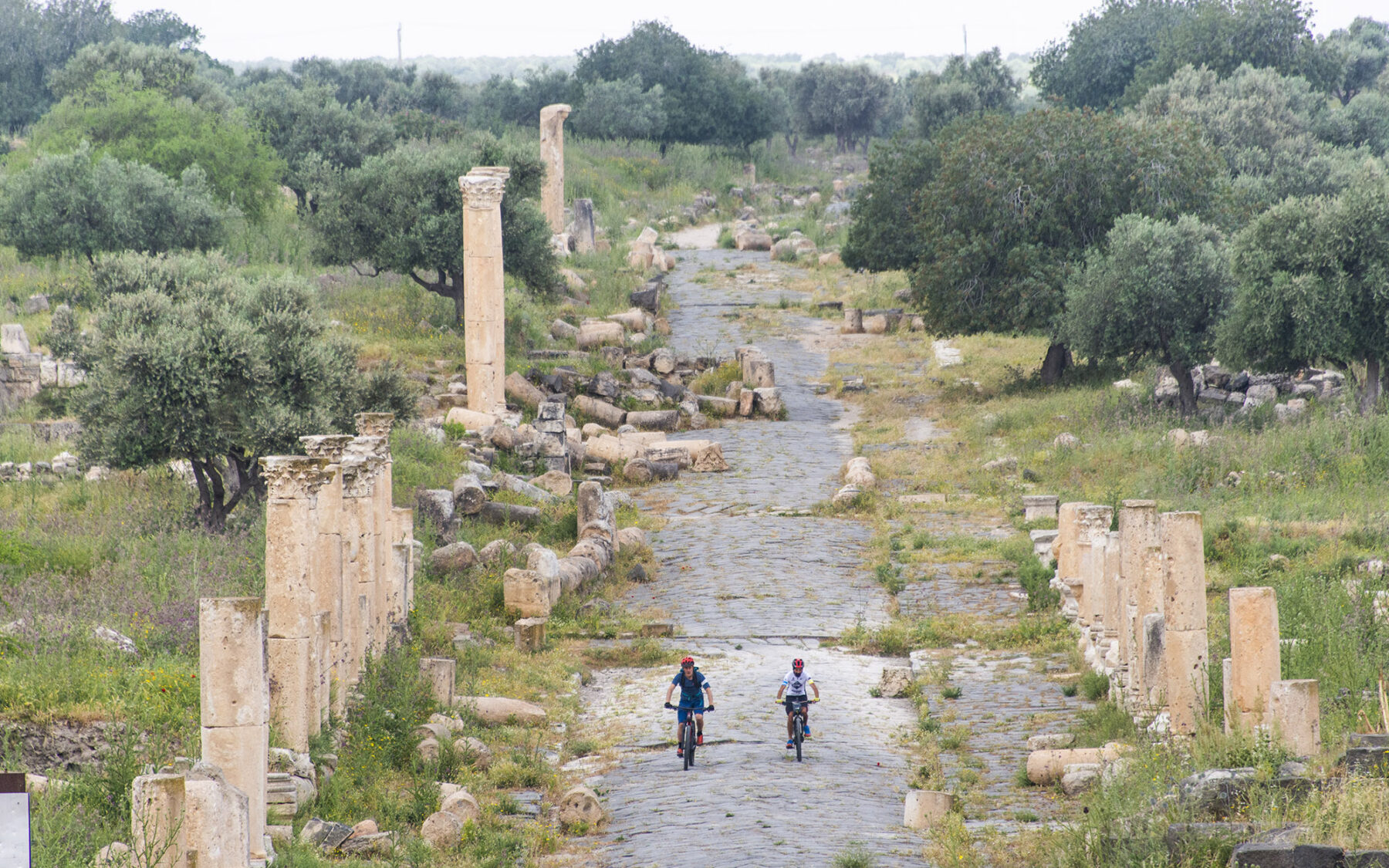
“Yalla, yalla,” I reply, clipping in then launching down the gritty sandstone. Seconds later, sharp white gravel crunches under the tires – a moment of respite before the trail curves onto an arm length-wide ledge. On one side, a slot canyon disappears into darkness. On the other, tangerine-pink rock rises upwards, sculpted by wind and water into a façade of gargoyles and ghouls. All muscles are engaged, the brain especially. Front wheel management, I think to myself. Baby head rocks litter the trail. So does goat dung. I stay in third gear to torque up a knee-high step, foolishly holding my breath where the trail wraps an exposed ledge. Once back onto less consequential terrain, I exhale. My mind mulls over best days ever on a bike; there’s been a few. This one however already ranks, and it’s not even half over. The trail beckons us onward up the wadi, valleys that flash flood when it rains. Besides what remains in our bottles, there’s not a drop of water in sight.
Again, I hear voices. The unrelenting desert sun can take a toll. Soon we’re granny gearing upwards. Loose rock makes for delicate pedaling. Just as we crest the rise, we’re startled by a young Bedouin goatherd, crouched on the hillside chatting to an older woman who’s shrouded in black, head to toe. Equally surprised, they spring to their feet and scurry a few yards away, not sure what to make of these-sun scorched interlopers on bikes. Their dog yaps nervously. Then the young one steps forward. The whites of her lively eyes, bright against deep brown skin, peer from an opening in her hijab.
“Where are you from?” she calls out, in high pitched Arabic suddenly brimming with cocksure confidence.
“Canada,” Sari tells her, nodding at photographer Kari Medig and me.
“Canada!” she shouts, incredulous, before uttering something else in Arabic.
I ask Sari to translate. He hesitates, then shrugs.
“She said, ‘Why don’t you go back to your own place?’”
It’s not meant as it sounds, he assures us. It’s more like, why would we cross oceans and continents to pedal bikes in the canyons of Jordan, a landscape inhabited for generations upon generations by her Bedouin kin? The answer is written plainly upon the ancient trails traversing the otherworldly landscape around us, as hard as it might be to convey to this young girl – the progeny of a different culture, a different world. Some concepts don’t translate.
The true meaning of cross-country in Jordan
A few years ago, I learned of the Jordan Trail, a 600km hiking route that traverses the country, north to south. So began a few months of back and forth with contacts in Jordan. It became clear that the country’s entire mountain bike community could fit in someone’s living room. “We don’t want roads this wide, we want trails this wide,” I said in one awkward Zoom meeting, using my arms as goal posts. Sympathetic faces looked back at me blankly from the screen. I felt like a needy child demanding something very specific for Christmas.
Except for 25km of Red Sea, Jordan is landlocked by Israel, Palestine, Syria, Iraq, and Saudi Arabia. It’s an island of stability in a region fraught with conflict and hostility – like Middle East, the light and moderate version. For thousands of years, its strategic location in the heart of the Arab world put it at the crossroads of trade and conquest. The overlapping influences of the Nabateans, Arab nomads who carved the magical city of Petra out of sandstone cliffs, Islamic kings, Roman conquerors, Crusaders and Ottoman rulers are layered upon the land like a messy home-baked birthday cake.

Past experiences told me that any country with thousands of years of civilisation like Jordan must have human highways that could be explored on bikes. Persistence paid off and good fortune landed us in a pick-up truck with Sari Husseini, a Jordanian of Palestinian heritage who was born in Jerusalem, and owns a bike store in Amman. He had recruited his friend Ahmad Al Saheb to be our driver. From first meeting, I liked Sari. He was funny, generous, whip smart, and honest; the sort of person who would have your back, no questions asked.
Now, six days into this Jordanian adventure and it feels like we have adopted two Arab brothers. We swap swear words in our native languages, talk about life in Canada and learn about their hopes and struggles balancing the expectations of conservative Muslim society with Western notions of personal liberty – things we take for granted, like being able to travel freely and fall in love with whoever we want.
Some folks ruminate quietly with thoughts like these, but not Sari. He can talk circles around an auctioneer, sometimes simultaneously while chatting on a Bluetooth that’s permanently attached to his left ear. This could be obnoxious, but Sari’s chatter is endearing and always interesting.
Hard yards and hospitality
Now, however, we’re pushing bikes through soft sand, drudgery that at the end of a long day in the saddle saps energy, even that of gregarious Sari. He is uncharacteristically quiet as we plod through a shifting, golden landscape, our only way out of the Abu Qusaib canyon. A camel would make sense here. Our trip had coincided inconveniently with the tail end of Ramadan, the most important occasion on the Muslim calendar marked by 30 days of fasting from sunup to sundown. Sari tells me he opted out of the last two days of Ramadan.
“We won’t tell anyone,” I say, pausing to empty the last tablespoon of water that sloshes around uselessly in my bottle.
“The only one who matters already knows,” Sari replies with a wink, before explaining a few practical Islam work-arounds. “If you skip a day of fasting you can do a make-up day to compensate.”
Fatigued and dehydrated, my mind wanders randomly from the challenges of fasting while on a mountain biking adventure, to the description I read last night of the yellow scorpion, endemic to Jordan: “Extraordinarily painful sting. Can be lethal or cause pancreatitis.”
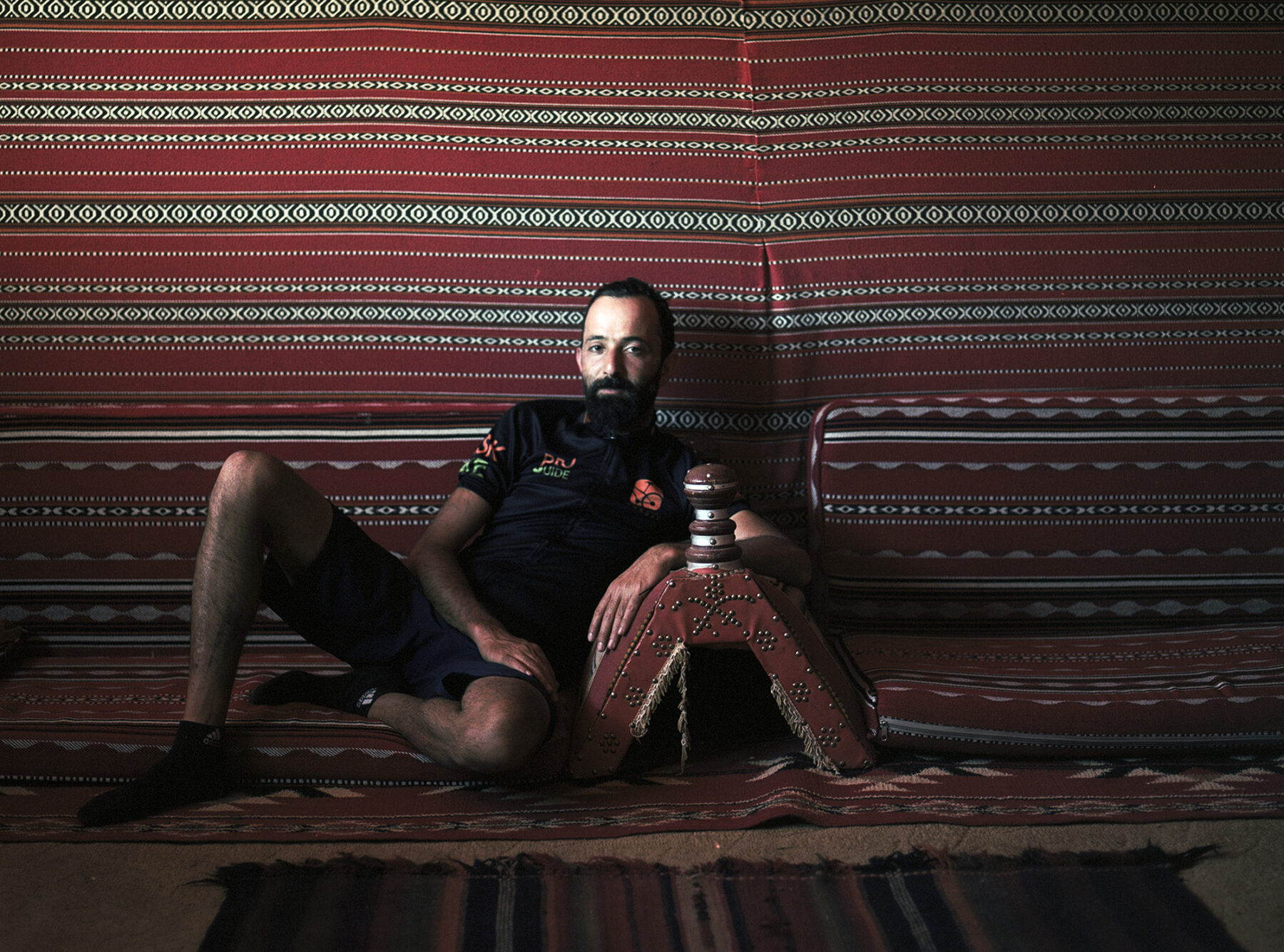
Afternoon fades to evening. My mouth feels pasty. Where the wadi spills out into an open plain, we find flat, hard-packed dirt. Three barefooted boys sprint toward us from a cluster of tents. Sari knows them from a previous hiking trip in the area.
“These people will look after you if you get in trouble,” Sari says, revealing his plan C, Bedouin search and rescue contingency if something goes sideways on the trail.
We’re ushered into the tent for tea with the men, brothers-in-law and the patriarchs of this extended family. The women vanish behind a curtain. In the desert, generosity is given without expectation of return, as natural a human impulse as breathing. They roll out a tattered red blanket and pillows for us to sit on. Tea is served sweet, as it always is in Jordan – normally too sweet for my tastes but right now, perfect.
They ask where we’re from.
“Canada,” Sari says again.
The two men nod, but their curiosity ends there. They continue chatting in Arabic and filling our teacups. Eventually Sari places his right hand over his heart, as is customary, then says “Shkran.” (Thank you.) We have more kilometres to ride to our meeting point with Ahmad on the highway that cuts arrow-straight through the Ard As Saawan Desert. The Bedouins offer us a ride in their pick-ups, but we decline, feeling energised and refreshed by the welcome cool of the desert evening.
Where water is gold
The next day Medig and I bounce around in the back seat of the pick-up, as Ahmad follows a rough road near Ras Al-Feid, a bony headland high above a barren riverbed. Water dominates political discourse in Jordan for good reason; there’s not much of it around. The chatter up front is intense, almost heated. Sari studies maps on his phone while formulating an emergency plan with Ahmad. His blue tooth, as always, is attached to his right ear, even though we lost the signal an hour ago.
“It sounds like we’re arguing but we’re not,” Sari says, perceptively looking in the rear view mirror. “That’s just how we talk in Arabic.”
From across the valley we spot our trail, switchbacks etched on a mountain called Jebel es Saffaha.
“Why don’t we start riding here?” I suggest.
Medig and I had spotted an enticing goat trail contouring the hillside just below the road.
“Sure, why not?,” Sari replies.
We load packs with food and fill water bottles then leave Ahmad, who has taken to worrying about us like a doting uncle even though he could be my son. The trail is raw and rugged, travelled most often by animals but also animated by human history, from the footfalls of Roman soldiers and tribal Arab kings to modern day trekkers. It’s a brake pad-burner to the valley bottom. Loose rocks make the cornering treacherous. Sari does well handling his hard tail, three-inch travel Scott XC bike complete with a seat-mounted reflector. Despite his initial trepidation, our guide has proven adept at balancing self-preservation with a willingness to push his riding skills.
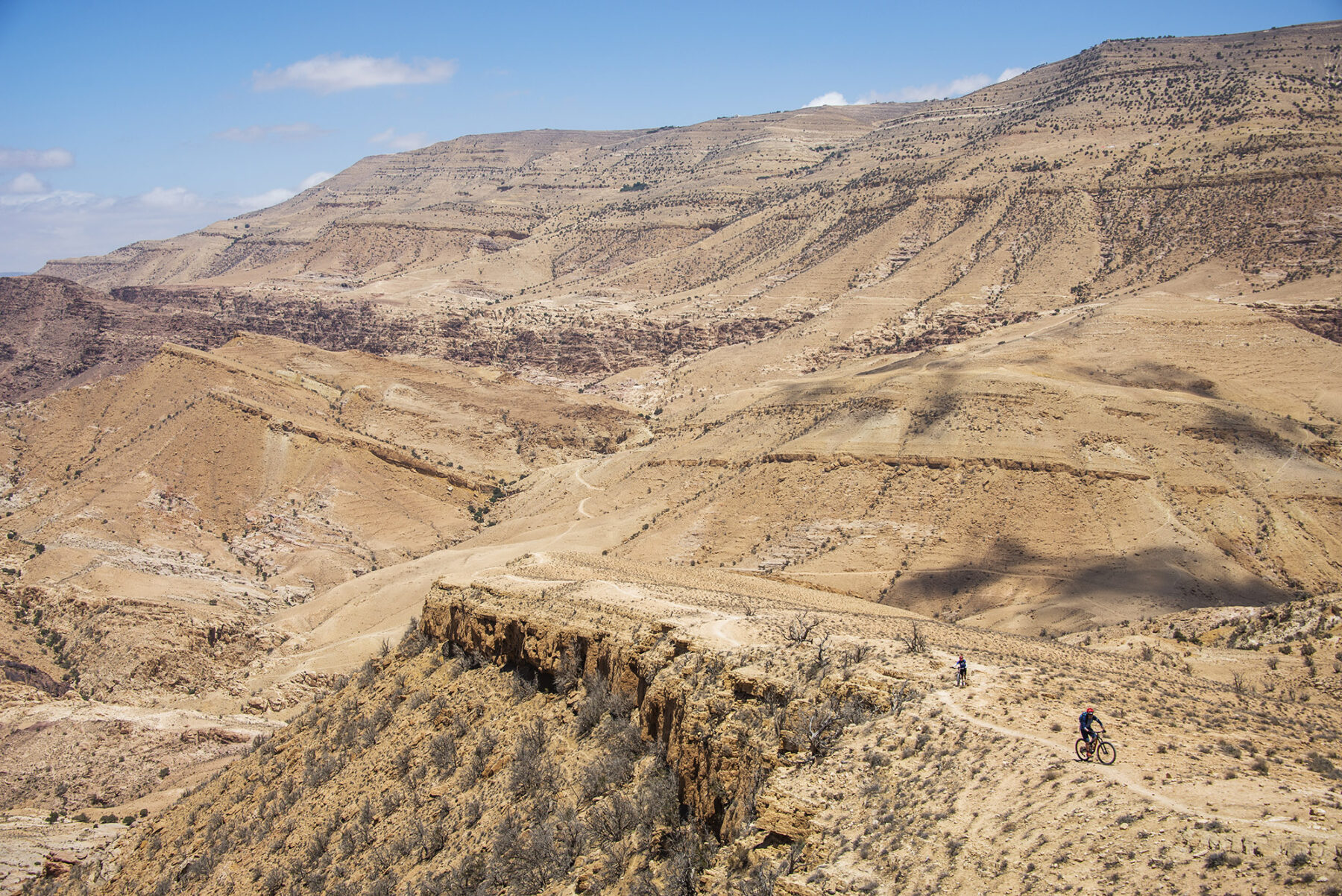
We shoulder our bikes across a dry riverbed then begin ascending the jebel, or mountain. Stunted conifers, branches sinewy and gnarled like sunburned arms, grow stubbornly from cracks in the rock. Life here is not to be taken for granted. I joke with Sari about my weeklong hiatus from post-ride beers, making him promise a stop at Carakale Brewing Company in Amman, the only craft brewery in the country, before we fly home. Deal, he says.
“I had alcohol once in my life. I wanted to know what it felt like to be drunk. I was lying face down on the floor looking at stars,” Sari explains earnestly.
Forty-five minutes of pedalling and pushing gets us to the ridge. The trail hugs the crest and climbs for another 20 minutes to Saffaha’s summit. To the west, valleys form deep folds between vertical sandstone pillars. Goat trails spindle off temptingly in all directions. It’s a wild and sparsely-populated landscape compared to the country’s north where we started this road trip. Though it feels like weeks ago, it’s been only days since we first hit Jordan’s rugged dirt at Umm Qais, a hilltop village next to the sprawling ancient Roman city of Gadara. Or, since we rode with the affluent members of an informal club called BAT (an acronym for badel (pedal,) arbesh (climb,) and tager (kite,) on the country’s only purpose-built mountain bike trails. It’s a scrappy affair in Amman National Park, and the day we visited a hot, dusty wind blew plastic bags into the trees in a seemingly ceaseless supply of garbage from nearby Amman, the sprawling capital city of more than four million people.
In Jordan, there’s always time for tea
The refreshing contrast is reason to linger at this viewpoint in Jordan’s mountainous south, not a soul in sight, silent except for the sound of Sari chattering on the two-way radio giving Ahmad a progress report. I notice a feverish twinkle in his eyes – trail fever – as he looks at the thin line unraveling before us.
“My god!” he says.
Wary of passing time and unknowns ahead, we hop back on our bikes. Smooth, ripping fast dirt, off-camber rock slabs, and assertive climbs weave among house-sized boulders – trail perfection manifest on a mountainside of our own. The only thing more beautiful than the trail is the landscape around us. But the ride demands focus. After rounding another ridge, we spot a cluster of pick-up trucks blocking the trail ahead. It looks ominous.
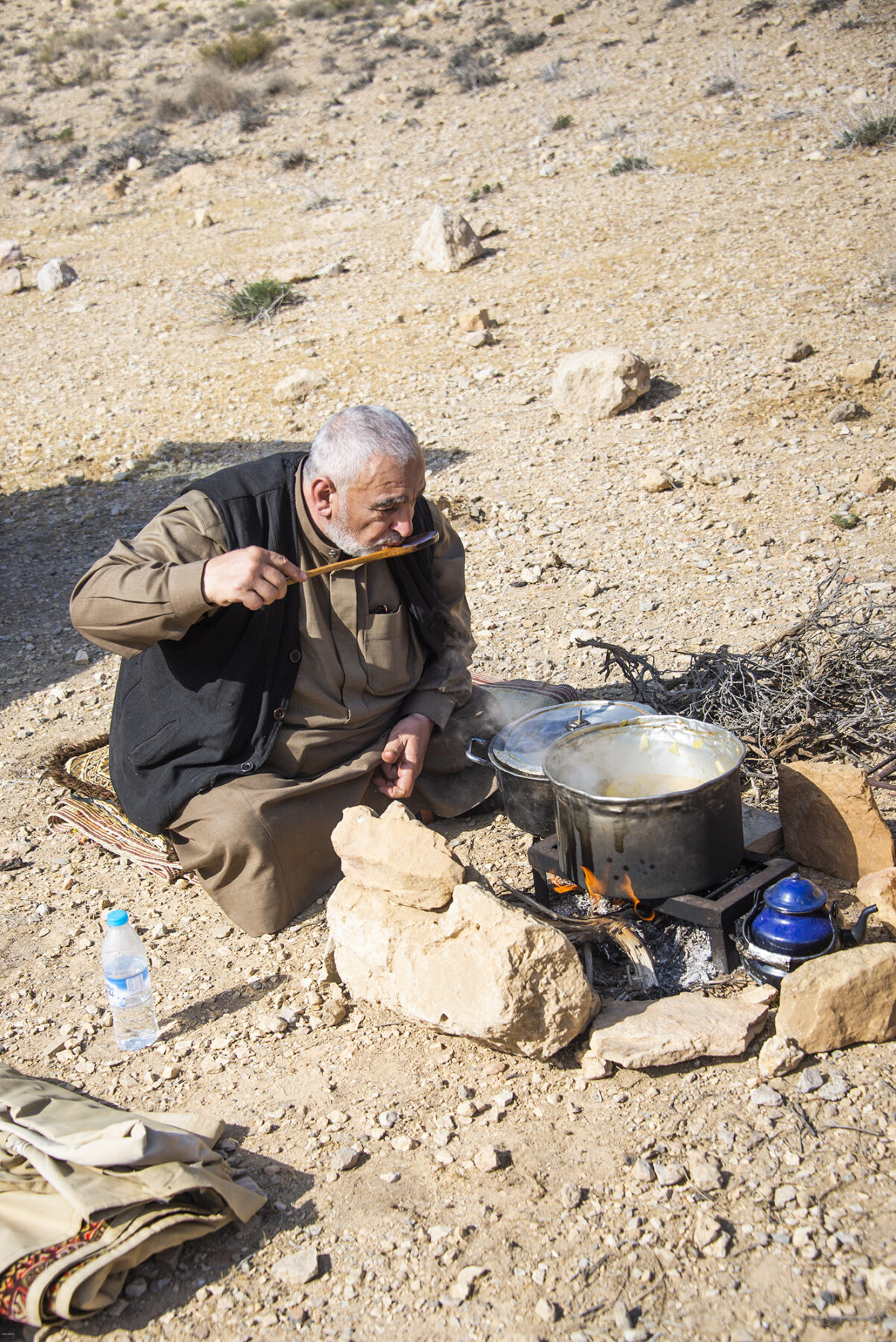
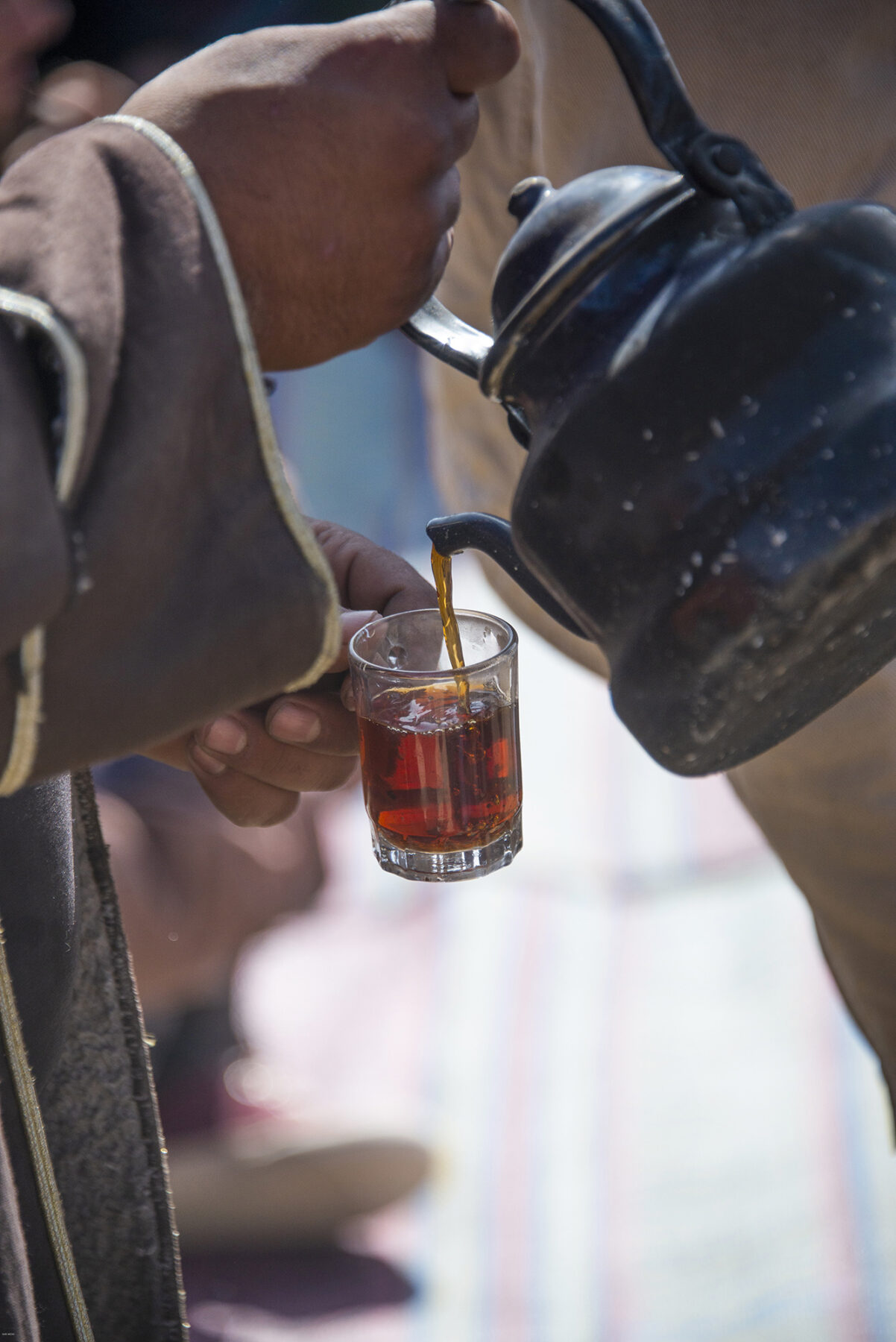
“Salam,” I say, as we roll up.
“Salam,” replies a lanky guy with a pair of shining gold-capped incisors.
He’s among a group of friends out celebrating Eid, the post Ramadan holiday.
As if by magic, one of them coaxes flames from a handful of twigs, arranges rocks around it, and puts a kettle on for tea. Tea leads to a lunch invitation from a round man with an easy laugh and a self-assured authority. Sari tell us that he’s an imam, or Muslim priest. My restless North American impulse tells me to kindly decline the invitation, but something convinces otherwise, that it would be rude to just ride away.
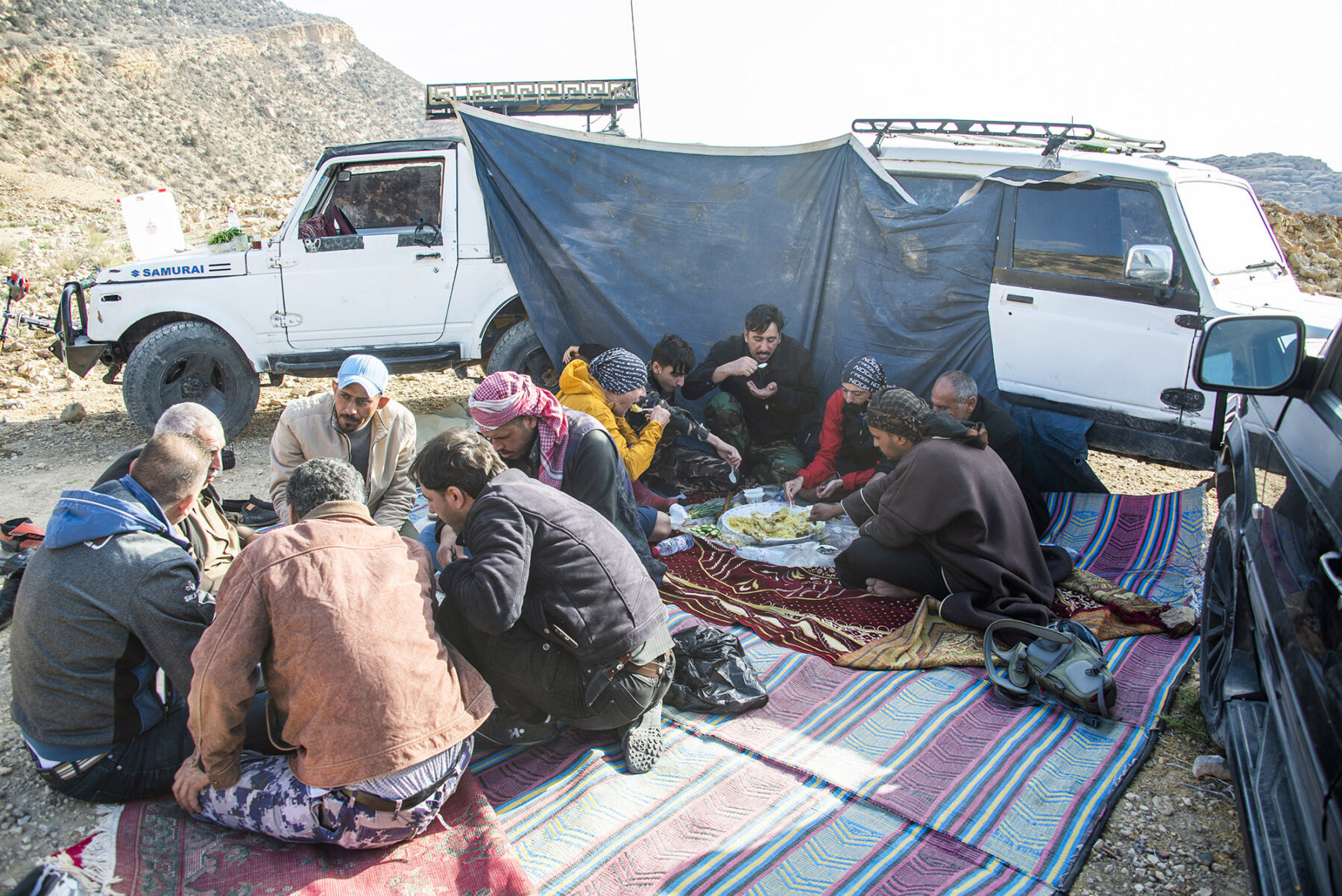
Soon a dozen of us are sitting cross-legged in a circle. Two Suzuki Samaris are parked at angles to block the wind. The conversation is lively. The imam jokes about coming to Canada to look for a younger wife. A devout young man with intense eyes, a moustache-less beard and prayer beads in one hand has more practical concerns and wants to know what we get for our taxes. The chain-smoking guy in black pants and black leather jacket makes ruthless fun of his truck-driving friend sitting across the circle who claims to be a schoolteacher.
“Him. A schoolteacher ..?” he says, trailing into unbridled laughter.
Then he abruptly changes the subject.
“What do you think about alcohol. Is it good or bad?” he asks through our tireless translator, Sari.
It’s a loaded question among people whose faith officially prohibits booze. If only they knew the true extent of my hedonist, heathen ways. I glance at the imam who’s listening intently. But instead of censure, his face lights up with laughter, before he gets up and returns with a platter of rice and chicken that had been cooking in a huge cauldron over open flame. My answer is a lame parroting of what my day told me often when I was a kid; “Everything in moderation, I suppose.”
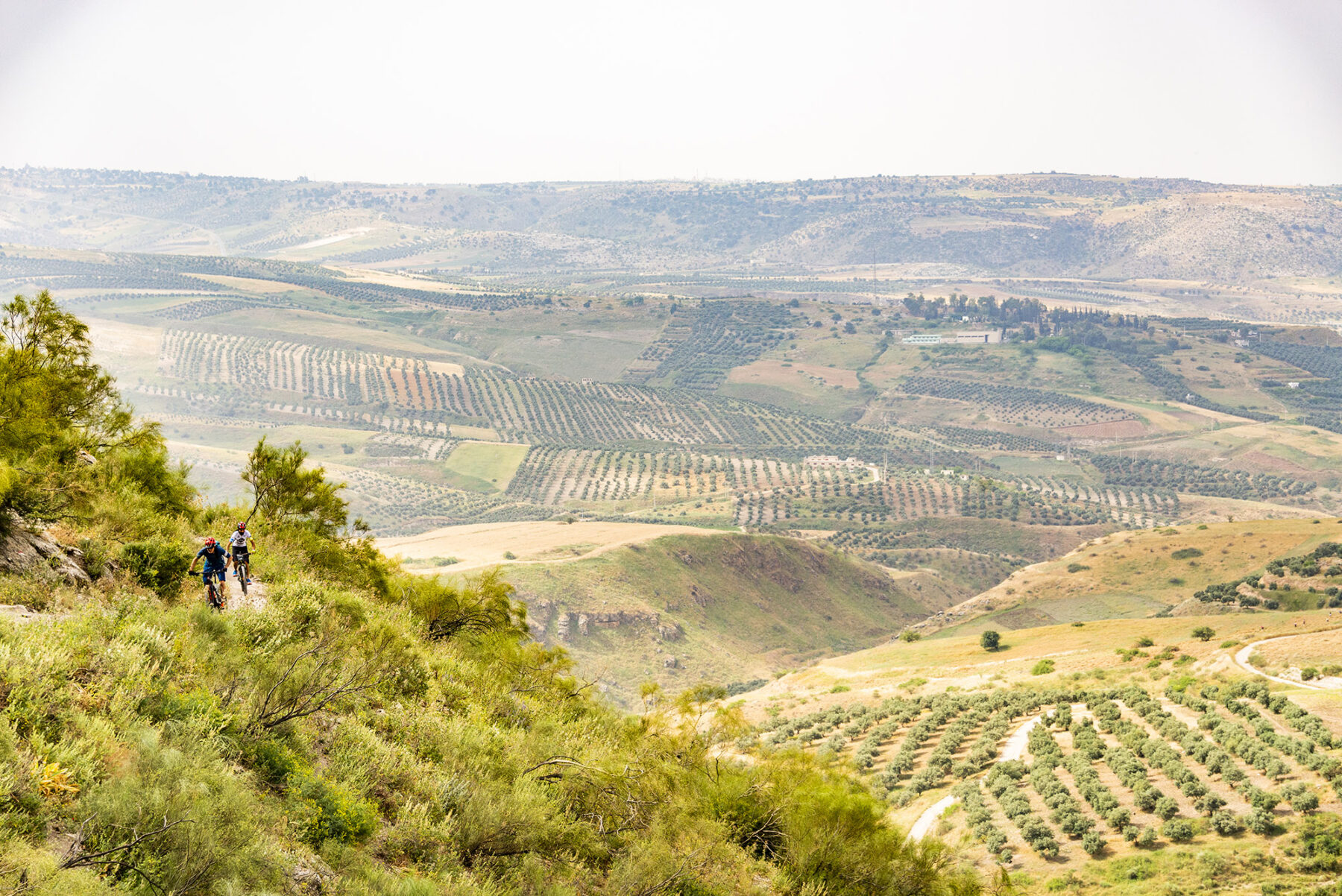
Three hours after stumbling upon this crew, Sari looks at his watch. Sunset is less than an hour away. Impending darkness is a powerful motivator, especially when you don’t have lights.
“We must go. Ahmad will be getting worried,” he says, winking.
The three of us rise from the blanket. Effusive thanks are neither expected nor required. Breaking bread and generosity with strangers is compulsory in a land where coping with scarcity is baked into the DNA of its inhabitants. I start pedalling, legs heavy with lactic acid, feeling like I’m on a different planet.
The trails are just one memory
Evening makes the sandstone cliffs glow ethereal. We pass a trio of young Belgian hikers hustling to reach their campsite. There’s no time for conversation, so we keep moving. Rocks and drops make for techy riding where the trail dips through dry gulches, the only evidence of the rain that rarely visits this land. We move not much faster than walking pace. Where the terrain mellows, our pace quickens. Smooth dirt and rock slabs lead to a highpoint. I stop to drink from a Pepsi that the imam gave me as a parting gift, then drink in the tantalising view into another tantalising valley. My legs and arms are bloodied and scratched. The trails of Jordan have indeed left their mark – physical and in some ways spiritual. We spot Ahmad’s truck, a kilometre distant, parked near a huddle of Bedouin tents. He’ll be pacing and looking at his watch.
“We are blessed,” Sari says.
“Inshallah,” I reply.
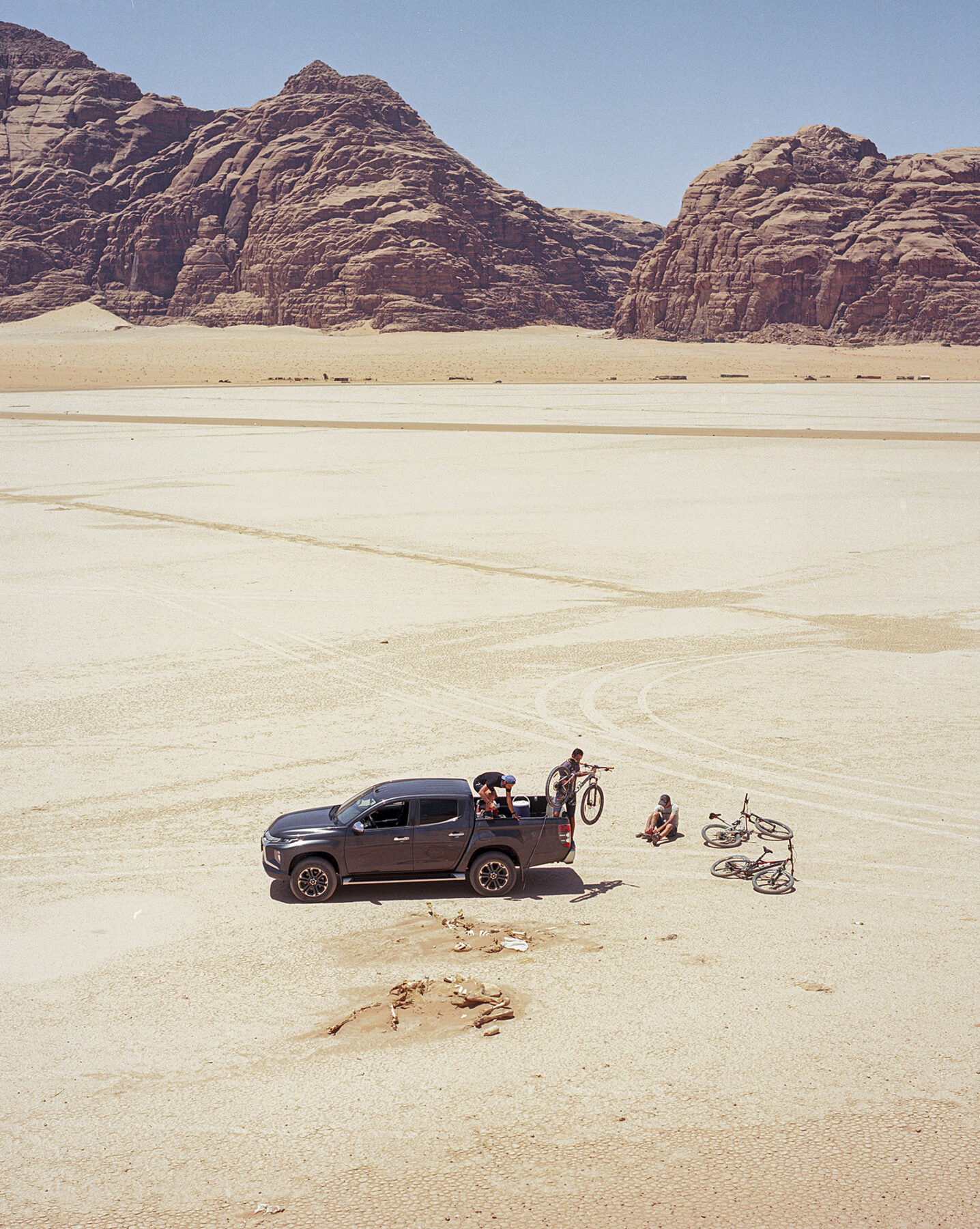
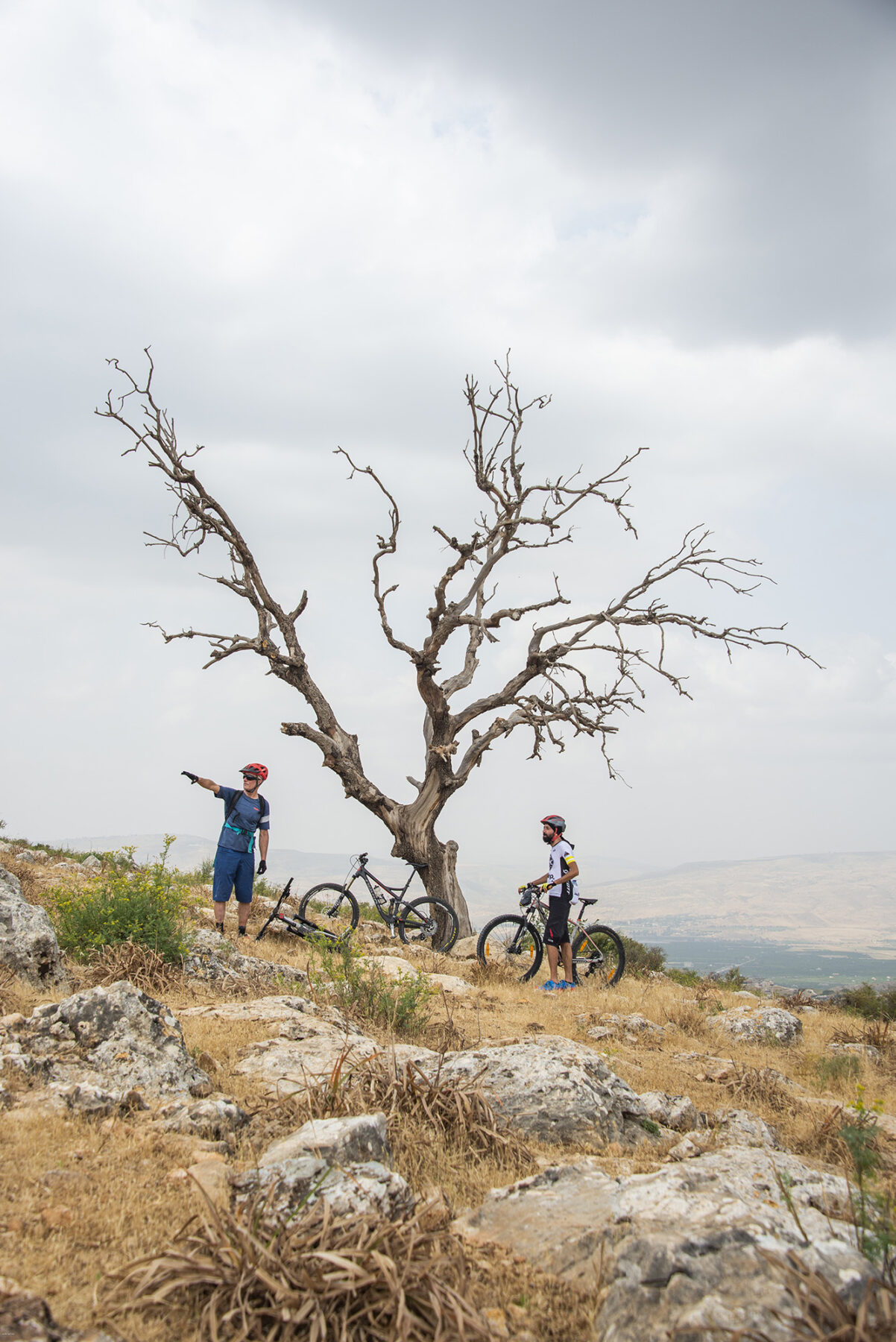
We came to Jordan on a self-absorbed quest to find trails, and find them we did. Along the way we discovered something much greater than lines on a map – warmth, humour, kindness and a basic humanity that bridges language and culture, no matter how wide the gulf may be.



